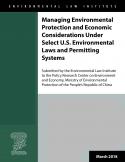
Research Reports
ELI publishes Research Reports available for free download that present the analysis and conclusions of the policy studies ELI undertakes to improve environmental law and policy. These reports contribute to education of the profession and disseminate diverse points of view and opinions to stimulate a robust and creative exchange of ideas. Those publications, which express opinions of the authors and not necessarily those of the Institute, its Board of Directors, or funding organizations, exemplify ELI’s commitment to dialogue with all sectors.
In response to growing concerns over increased air and water pollution, by the early 1970s the United States Congress had begun enacting a series of statutes that continue to shape environmental law today, more than four decades later. The laws authorize federal agencies to regulate air quality, water quality, the management and disposal of solid and hazardous wastes; and to protect threatened or endangered species of plants and animals. Congress, in enacting these environmental laws, knew that it was imposing significant compliance costs on regulated sectors of the economy.
Read More >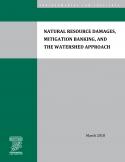
The Oil Pollution Act and CERCLA allow for the recovery of more than just cleanup costs following an oil spill or the release of hazardous substances. These laws also provide for recovery of damages to restore or replace natural resources to the conditions that would have existed prior to the spill or release, as well as to compensate for interim losses of ecological services.
Read More >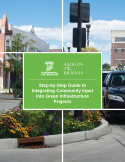
ELI and its partner Amigos Bravos drafted this Guide to help local governments integrate community input into their green infrastructure projects. It sets out eight steps that local governments can take and, for each step, provides details and tips to help local governments as they move through the process.
Read More >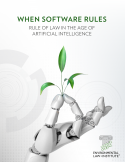
Artificial Intelligence (AI) is changing how our society operates. AI now helps make judiciary decisions, medical diagnoses, and drives cars. The use of AI in our society also has important environmental implications. AI can help improve resource use, improve energy efficiency, predict extreme weather events, and aid in scientific research. But while AI has the potential to improve human interaction with the environment, AI can also exacerbate existing environmental issues. Some form of governance is needed to ensure that AI is deployed in a manner that is beneficial for our environment.
Read More >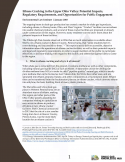
The ongoing boom in shale gas production has created a market for shale gas byproducts, including ethane, in Pennsylvania, Ohio, and West Virginia. "Cracker" facilities convert ethane into usable chemical products, and several of these cracker facilities are proposed or already under construction in this region. However, many residents want to know more about the potential impacts of these facilities.
Read More >